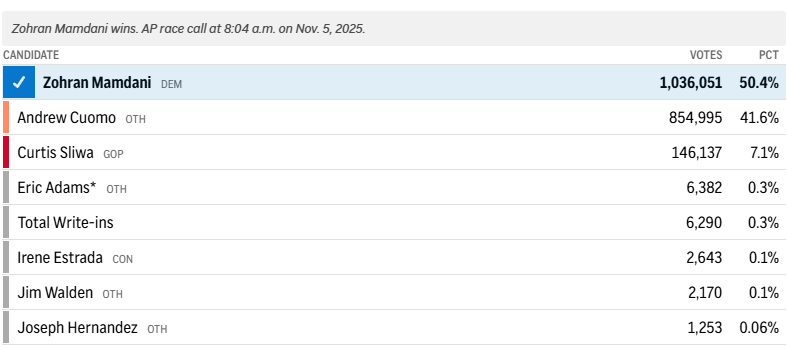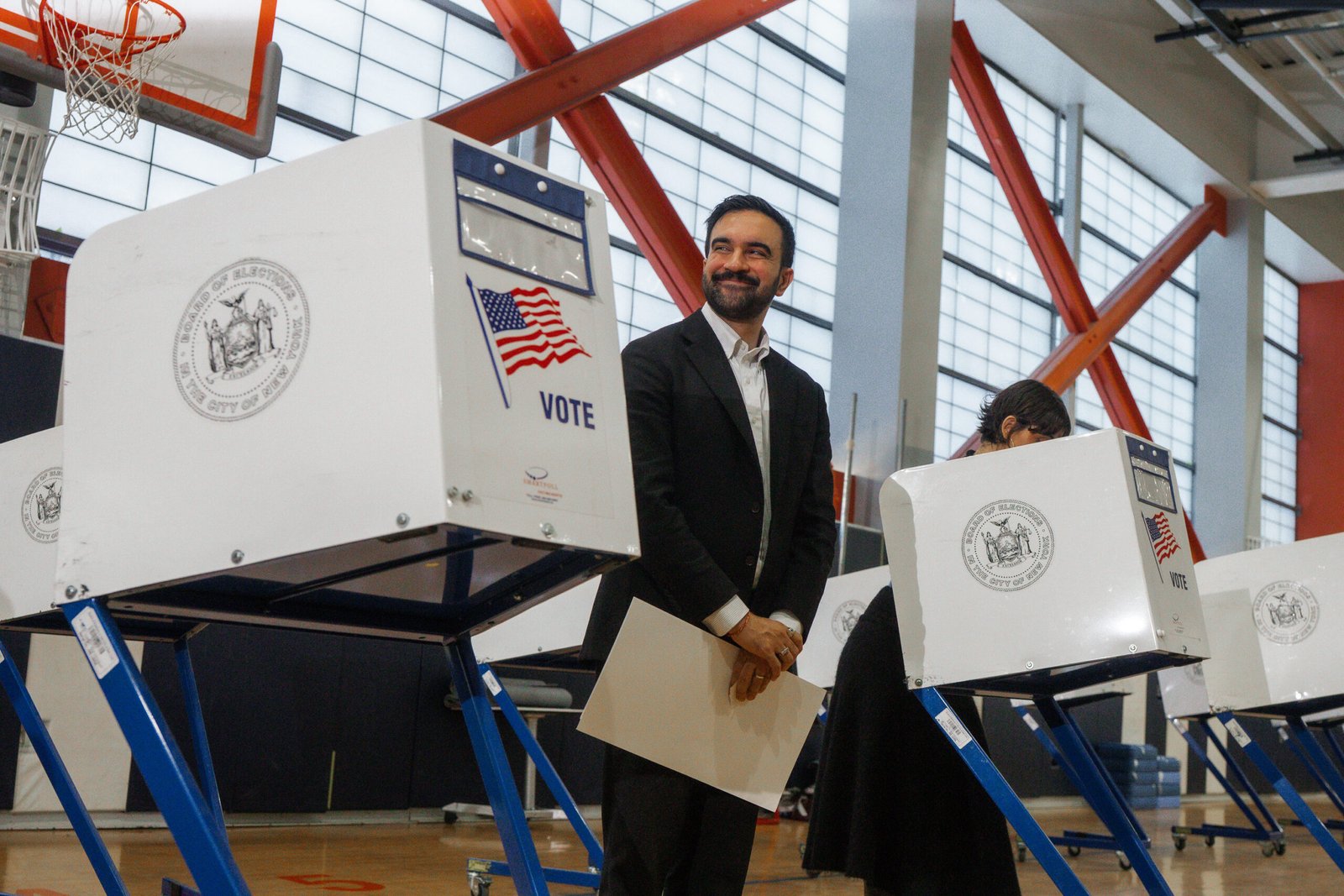Zohran Mamdani Elected New York City Mayor, Making History as First Muslim and Youngest Leader in a Century

NEW YORK, Nov. 5, 2025 — Zohran Mamdani, a 34-year-old state lawmaker and democratic socialist, has been elected mayor of New York City, marking a historic victory that cements his rapid rise from political newcomer to one of the most influential progressive voices in the country.
Mamdani defeated former Governor Andrew Cuomo and Republican Curtis Sliwa in a high-turnout race, becoming the city’s first Muslim mayor, its first leader of South Asian heritage, and its youngest mayor in more than 100 years. His victory also represents a milestone for the progressive wing of the Democratic Party.
A Progressive Mandate for Change

Addressing a jubilant crowd in Brooklyn, Mamdani said his win was a mandate from working-class New Yorkers who wanted real change.
“I am young, I am Muslim, I am a democratic socialist — and I refuse to apologize for any of this,” he told supporters. “New York, tonight you have delivered a mandate for change.”
He pledged to “wake up each morning with a singular purpose: to make this city better for you than it was the day before.”
With over 2 million ballots cast, New York City recorded its largest mayoral turnout in half a century. As of Tuesday night, Mamdani held a nine-point lead over Cuomo with roughly 90% of votes counted, according to the city’s Board of Elections.
Cuomo Concedes, Calls for Unity
At his own event in midtown Manhattan, Cuomo conceded defeat, congratulating Mamdani while warning that New York faced “a dangerous road ahead.”
“Almost half of New Yorkers did not vote to support an agenda that makes promises we know cannot be met,” Cuomo said. But when some supporters began to boo Mamdani’s name, he quickly stopped them, adding, “No, that’s not right. Tonight was their night.”
Cuomo’s campaign, seen as a political comeback attempt after his 2021 resignation over sexual harassment allegations, was marred by controversy and accusations of negativity. Mamdani’s energetic grassroots movement — built on affordability, optimism, and social reform — ultimately eclipsed the former governor’s establishment support.
Historic Firsts and National Implications

Mamdani’s election is seen as a turning point for New York’s political landscape. Born in Uganda to Indian parents, Mamdani immigrated to the U.S. as a child and became a naturalized citizen in 2018. His story resonates with the city’s immigrant communities and younger voters.
His victory also underscores the strength of the Democratic Party’s progressive wing, which has urged national leaders to embrace bold, populist candidates rather than centrist figures.
However, his rise has already drawn sharp criticism from Republicans, including former President Donald Trump, who labeled Mamdani a “radical socialist” and threatened to cut federal funding to the city. On Truth Social, Trump posted, “…AND SO IT BEGINS!” shortly after the results were announced.
In response, Mamdani declared that New York would remain “a city built by immigrants and led by one.”
“If anyone can show a nation betrayed by Donald Trump how to defeat him,” he said, “it is the city that gave rise to him.”
An Ambitious, Controversial Agenda
Mamdani’s campaign centered on sweeping proposals aimed at reducing inequality and improving life for middle- and lower-income residents. Among his promises:
Free child care for all families
Free city bus service
City-run grocery stores in underserved neighborhoods
A Department of Community Safety, replacing certain police responses with trained mental-health professionals
Skeptics, including Democratic Governor Kathy Hochul, have questioned how these programs will be funded. Hochul has opposed Mamdani’s plan to raise taxes on wealthy New Yorkers, setting up a potential battle between City Hall and Albany.
Mamdani’s relationship with the New York Police Department will also face scrutiny. As an Assembly member in 2020, he called the NYPD “a rogue agency” and supported defunding efforts — comments he has since walked back. He now says he will retain the current police commissioner to ensure stability during the transition.
Balancing Progressive Vision with Political Reality
Mamdani’s political inexperience has fueled doubts about his ability to govern the nation’s largest city. His critics point to his short tenure — less than five years in the state legislature — and a lack of executive experience.
Supporters, however, see his youth and outsider status as strengths. “He speaks to us, not at us,” said one voter at his victory rally. “It’s about time City Hall looked like the people who live here.”
Still, analysts warn that delivering on his progressive platform will require navigating New York’s powerful unions, business interests, and state government — all while maintaining a working relationship with a hostile federal administration.
Cuomo and Sliwa Falter in Divided Race

Cuomo’s campaign never fully recovered from his tarnished reputation or the lingering anger over his handling of the COVID-19 pandemic. His messaging focused largely on attacking Mamdani as “too radical,” while trying to contrast his own decades of experience in government.
Republican candidate Curtis Sliwa, founder of the Guardian Angels crime-prevention group, struggled to gain traction in a heavily Democratic city. He conceded early, wishing Mamdani “good luck — because if he does well, we do well,” but warned against “turning New York into a socialist experiment.”
From Little-Known Lawmaker to Political Phenomenon
When Mamdani announced his candidacy, few believed he stood a chance. A relative unknown outside his Queens district, he gained attention through viral social-media videos, grassroots rallies, and a populist message that resonated with younger and working-class voters.
His campaign mixed activism with community engagement — organizing events like a citywide scavenger hunt and a soccer tournament to connect with residents. By the time of the Democratic primary, Mamdani had built a loyal base and beat Cuomo by 13 percentage points.
That momentum carried him through the general election, as his focus on affordability and inclusion appealed to a city still grappling with inequality, high housing costs, and post-pandemic recovery.
Looking Ahead
Mamdani takes office on January 1, 2026, inheriting a city of eight million residents — and a long list of challenges. From housing shortages and crime concerns to strained relations with Albany and Washington, his administration will be tested from day one.
But for many New Yorkers, his victory symbolizes a renewed hope for change. “This is not just about one man,” Mamdani told his supporters. “It’s about every New Yorker who still believes this city can belong to all of us.”


